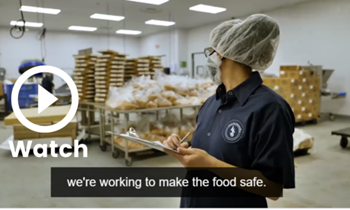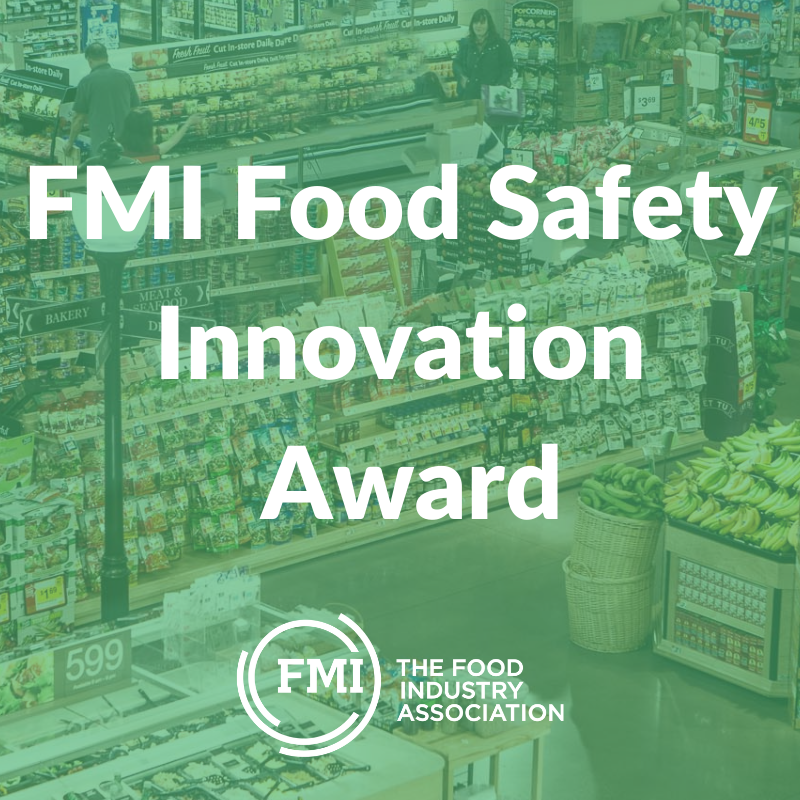By Hilary Thesmar, PhD, RD, CFS, Chief Food and Product Safety Officer and Senior Vice President, Food Safety, FMI and Gigi Vita, Chief Food Safety Assessment Officer & Senior Vice President, SQFI

As we gear up to celebrate World Food Safety Day, June 7, 2021, we look at the important relationship between food suppliers and retailers and the responsibility food safety professionals have to assure food moves safely through the supply chain.
Baked goods from The Killer Brownie® Co. are not only comfort food for consumers, laden with ingredients like buttery caramel, silky chocolate chips, and crunchy pecans, but they also provide comfort to the food retailers that carry the product line.
Food safety is baked into the company’s food culture as much as sumptuous ingredients are baked into their moist brownies. This is a manufacturer that trains employees on food safety starting on their very first day—from cleaning to proper handwashing to good personal hygiene everyone on the team takes part in food safety from every corner of the business and at every step in the process.
Food and quality at Killer Brownie boils down to one question that has become a guiding mantra: “Is this something that you’d feed your family?”
Company president Chimene Mayne Ross points out that manufacturers and food retailers share a common goal in providing safe foods to consumers. “The real purpose of food safety is actually much bigger than just sales and partnerships. The real reason to do it is because it matters,” she says.
This common goal is especially important for manufacturers of private branded products like Killer Brownie’s baked goods that carry a retailer’s name and, inherently, its reputation. Retailers want and need assurance that products sold in their stores are safe and are made according to the highest standards.
Killer Brownie provides that confidence by adhering to the Safe Quality Food (SQF) program. As an SQF-certified site, the company not only meets SQF Institute’s food safety and quality standards but exemplifies a commitment to food safety and a strong food safety culture that is emphasized in the new SQF Edition 9.
“The reason partners value certification is because they know there are certain standards that you have to go through to achieve certification which really limits the risk with the product they bring in that they then share with customers,” Ross explains.
Killer Brownie team members follow stringent practices and verification checks from end-to-end at their Ohio production facility, an SQF certified site, from continually monitoring and verifying equipment and surfaces cleaning to reviewing suppliers’ ingredient analyses to inspecting product after packaging with metal detection. “Even though we know when our auditor is coming, if you were to pay a surprise visit today, I have no doubt in my mind that we would pass with an excellent score,” says Polly Tartaro, food safety manager at Killer Brownie.
That said, audits are one part of a greater collective effort. “We’re not working for the audits – we’re working to make the food safe,” says Ross. Learn more about how the Killer Brownie Co. invests in food safety culture.
The Killer Brownie Co. began as an exclusive supplier to Dorothy Lane Market stores in Ohio and now works with retailer partners across the U.S. Brownies are available in retail-ready packaging and in bulk slabs for use in building bakery cases and merchandising displays.
Implemented in May 2021, SQF Edition 9 is the latest version of the Safe Quality Food (SQF) Code, a GFSI-recognized certification code. A division of FMI, SQFI invests in the SQF Program, which is based on sound scientific principles and ensures the highest quality standards are consistently applied across all industry sectors. Food facilities in the global supply chain, from farms and orchards, through manufacturing and distribution, to wholesale and retail, are eligible for certification.
For information and ideas to celebrate #WorldFoodSafetyDay visit: www.foodsafetyday.org.


 Industry Topics address your specific area of expertise with resources, reports, events and more.
Industry Topics address your specific area of expertise with resources, reports, events and more.
 Our Research covers consumer behavior and retail operation benchmarks so you can make informed business decisions.
Our Research covers consumer behavior and retail operation benchmarks so you can make informed business decisions.
 Events and Education including online and in-person help you advance your food retail career.
Events and Education including online and in-person help you advance your food retail career.
 Food Safety training, resources and guidance that help you create a company food safety culture.
Food Safety training, resources and guidance that help you create a company food safety culture.
 Government Affairs work — federal and state — on the latest food industry policy, regulatory and legislative issues.
Government Affairs work — federal and state — on the latest food industry policy, regulatory and legislative issues.
 Get Involved. From industry awards to newsletters and committees, these resources help you take advantage of your membership.
Get Involved. From industry awards to newsletters and committees, these resources help you take advantage of your membership.
 Best practices, guidance documents, infographics, signage and more for the food industry on the COVID-19 pandemic.
Best practices, guidance documents, infographics, signage and more for the food industry on the COVID-19 pandemic.
